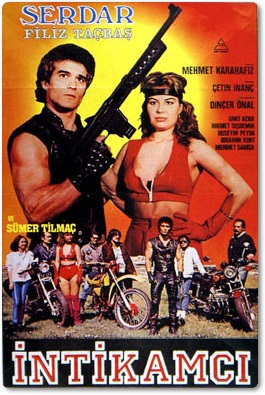1976
Director: Lam Fook Dai
Starring: Chen Sing, Chia Ling, Kao Fei
The unofficial title for this movie is Shaolin Tamo Buddhist Monk. It has been labeled as alternately Monk, Shaolin Monk, Tamo Monk and Buddhist Monk. It is unknown which is the original or correct title, thus the conglomerate (and long winded) moniker it has since received. Killer Priest (also, Killah Priest) is it's U.S. video retitling. As for the Kung Fu Exorcist title, that was what it was called upon it's U.S. theatrical release. I personally hadn't known that until fairly recently and was searching for what I had thought was this "elusive kung fu/ horror combo" for many, many years, never realizing that I had already seen it long ago. With that discovery came a tremendous feeling of disappointment (I had built up Kung Fu Exorcist in my mind as a so-bad-it's-good cult flick). Certainly there was nothing in Shaolin Tamo Buddhist Monk that justifies it's exploitive U.S. retitling. However the discovery did have one positive effect, it made me dig up my old vhs copy of this silly flick (which I had dismissed some fifteen years ago as mediocre) and caused me to revise my opinion of it.
The film centers on Bodhi Dharma, the fabled Indian (though some say Persian) monk who traveled to China, preaching the ways of Buddhism and being the one who introduced martial arts to Shaolin. What could have been a serious telling of the legend is instead reduced to the level of often ridiculous comic book-like shenanigans. While much of Bodhi Dharma's travels have taken on the status of legend since few of his exploits have actually been properly documented, this film goes the extra mile (and then some) with some supremely silly vignettes. There's an evil wizard who through intensive training, can burn opponents to death with his blackened hand, the wizard's zombified disciples who are color coordinated (both in their outfits and painted skin tones), a particularly over the top use of accupuncture and strangest of all, our hero's ability to communicate through his floating shoe! (though I did find out through research that this was somewhat based on an actual event as after Bodhi Dharma's death, a man had a vision of the monk "returning home" whilst holding his shoe for some cryptic reason).
No two ways about it, Shaolin Tamo Buddhist Monk is a really stupid, bad film. Yet I'm giving it a fairly high rating because it is also a fairly fun, stupid, bad film. For such disjointed ridiculousness, the cast gives it their all. Chen Sing puts forward the most majestic performance of his career as the mystical Bodhi Dharma. It is a perfectly underplayed performance and one that probably deserved a more serious film to go along with it, but nevermind. His lengthy knockdown, dragout supernatural final bout with the evil wizard is very cool stuff. It helps that the wizard is played by the ever present Kao Fei and watching these two fu vets duel was bigtime fun. The film however is stolen by Chia Ling (aka Judy Lee) who's fighting femme opposes Bodhi Dharma after her main squeeze walks out on her in order to follow the mystic monk on the road to enlightenment. She REALLY does not take well to it and her over the top tantrums are a joy to behold. Chia has certainly evolved from the early, dead serious days of Queen Boxer.
Shaolin Tamo Buddhist Monk is definitely something of a cult oddity. It may represent a missed opportunity to tell the classic Bodhi Darma tale in a serious manner but for the tradeoff, we have one of the more unusual head scratchers of 70s martial arts cinema. Still disappointed by the whole Kung Fu Exorcist thing though, but I'll get over it... eventually.
**1/2 / ****



